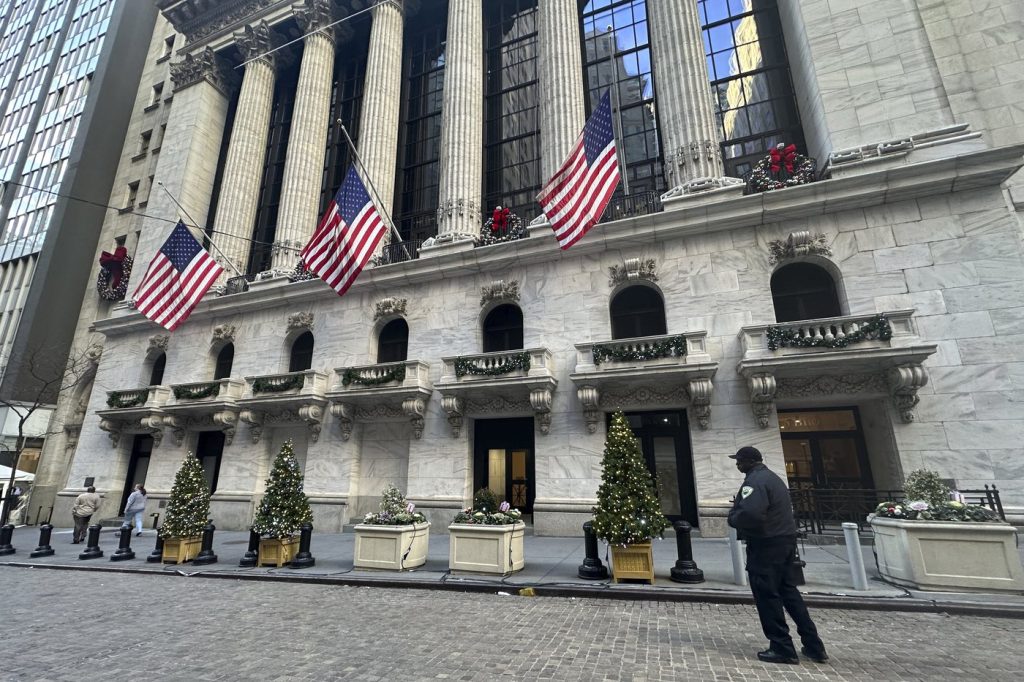Asian shares exhibited a mixed performance on Tuesday, reflecting the trading trends seen on Wall Street where gains in oil-and-gas companies countered losses in major tech stocks. The Nikkei 225 in Japan saw a decline of 1.8% to close at 38,469.58 as it reopened after a holiday. Conversely, Australia’s S&P/ASX 200 gained 0.4%, reaching 8,220.50. South Korea's Kospi remained relatively stable, dipping less than 0.1% to 2,489.33. The Hang Seng Index in Hong Kong surged 1.5% to 19,163.92, and the Shanghai Composite Index rose 2.2% to 3,229.99.
Market strategist Yeap Jun Rong noted that Japan's markets were playing catch-up following a significant sell-off from the previous week. Adding to this, Japan’s Finance Ministry reported a substantial rise in the current account, which increased to 3.4 trillion yen ($21 billion) in November, marking a 54.5% growth compared to the same month last year.
On Wall Street, the S&P 500 index grew by 0.2% after recovering from an initial 0.9% decline. The Dow Jones Industrial Average climbed 358 points, or 0.9%, while the Nasdaq Composite faced a setback, falling by 0.4%. The fluctuations in stock prices have raised concerns as the S&P 500 is coming off four losing weeks out of the last five, driven by waning expectations regarding the Federal Reserve's prospects for lowering interest rates in the near term.
The potential for interest rate cuts typically boosts market performance, which had seen record highs last year based on expectations of further cuts after the Fed began reducing rates in September. However, persistent inflation above the Fed's 2% target and robust economic data suggest that the economy may not require significant assistance, leading to doubts about whether rate cuts will occur in 2025.
In this volatile environment, high interest rates exert downward pressure on asset prices, particularly impacting companies viewed as overvalued. Nvidia, a significant player in the tech sector, declined by 2%, heavily weighing on the S&P 500, though this drop represents a small fraction of its substantial gains in recent years, driven largely by interest in artificial intelligence technology. Similarly, Apple’s stock dipped 1% and Meta Platforms faced a fall of 1.2%, further contributing to the market's downward pressure.
Moderna experienced a notable decline of 16.8%, marking the largest loss within the S&P 500, after it issued a revenue forecast for the upcoming year that fell short of expectations. The company is also facing a slowdown in COVID-related sales and is accelerating its cost-cutting measures. Macy's shares tumbled 8.1% as it anticipated revenue figures for the last quarter of 2024 that may fall at or below its previously forecasted range.
Edison International faced an 11.9% drop amid ongoing wildfires affecting its Southern California Edison utility operations. The company is under investigation to determine if its equipment contributed to a recent fire. Conversely, oil-and-gas firms saw gains as oil prices climbed. The price of benchmark U.S. crude oil increased by 2.9% to $78.82 per barrel, while Brent crude rose 1.6% to $81.01, partly fueled by expanded sanctions on Russia’s energy sector imposed by the Biden administration.
Exxon Mobil's shares rose by 2.6%, and Valero Energy saw an increase of 4.9%. U.S. Steel shares climbed 6.1% following the administration's extension of the deadline for the company to divest from its proposed acquisition by Japan's Nippon Steel. Intra-Cellular Therapies surged by 34.1% after Johnson & Johnson announced its acquisition of the biopharmaceutical company for $132 per share in cash. Johnson & Johnson's shares rose by 1.7% in response to the news.
Overall, the S&P 500 gained 9.18 points to reach 5,836.22. The Dow Jones Industrial Average rose by 358.67 points to 42,297.12, while the Nasdaq Composite decreased by 73.53 points, closing at 19,088.10. In the bond market, Treasury yields increased slightly, with the yield on the 10-year Treasury rising to 4.78%, compared to 4.76% at the end of the prior week, continuing an upward trend that has been in place since September when yields were below 3.65%.
In currency trading, the U.S. dollar strengthened slightly against the Japanese yen, rising to 157.70, while the euro was priced at $1.0255, down from $1.0274.










